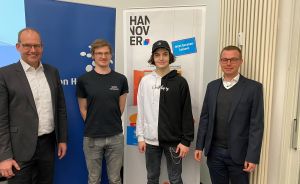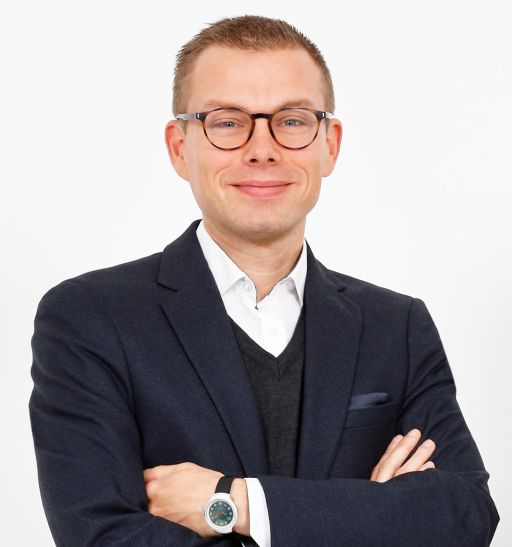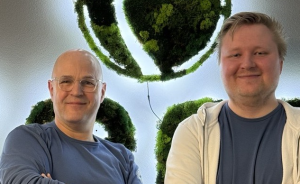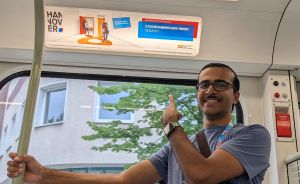 Hanover Region
Hanover RegionPeter Behrens GmbH, Lehrte
 Hanover Region
Hanover Region In his role as a trainer at Ing. Peter Behrens GmbH, one major difference to other applicants is the social competence of the graduates, i.e. they are somewhat older than the traditional trainees, who usually start their training at the age of 16/17.
They have already had experience with other people and have already gained life experience. They are generally more organized, as they have to be during their studies. They are usually also very determined and want to achieve their goal quickly and are therefore eager to learn and can learn very well. Above all, graduates are also much better at theory, which is relatively complex, especially in our profession of plumbing, heating and air conditioning system mechanic, and are more likely to understand the interrelationships.
In addition to hiring Didier, the craft business has already had experience with high school graduates who have then completed an apprenticeship with us because they want to do something practical. One of the main reasons is that the young people want to work with their hands and are tired of school. The trainees are often very happy to see what they have really achieved with us on a daily basis. Of course, these are top trainees who are keen to learn, who are eager to learn and determined, and that makes it much more fun for everyone. These trainees often shorten their training.
Yes, I think change is an issue for many trainees, young people and students. Most of them are stuck on the subject of dropping out of university - they didn't make it, didn't achieve it, are afraid of disappointing parents, friends, their environment, and also the stigma of having to stand there with a dropped-out course and say: "Too stupid to study". The other issue is that there is an alternative.
Doing an apprenticeship. And I think the vast majority of them are happy.
When asked what makes it difficult to approach people interested in training, Jens Niemann says that there is a lack of public relations work in this area anyway. The skilled trades in particular have a negative image, which is changing, but in general we tradespeople tend to be more disreputable, which means that the professions appear to be poorly paid, with no chance of promotion and only for "cognitively simple-minded people". This means that high school graduates or secondary school students are hardly willing to learn a trade.
Again, our profession is highly technical and very complex, offers a very broad field and is absolutely extensive. We actually need significantly more employees who have a high level of expertise and can deliver high Transfair performance.
For us, it is about understanding the highly complex heating, air conditioning and ventilation systems and their controls and how they work in order to find faults and carry out repair work sensibly. Yes, and of course to carry out maintenance and service on the system and, if necessary, to advise the customer. We don't actually have the expertise, we don't have the people. In my opinion, it's also a social problem that many young people are only being shown: Go to university if you have A-levels. Or they are told: You have to study, you have to do A-levels, you won't achieve anything if you don't do well at school.
One solution lies in the willingness to train and in employer branding as a good training company
Own strategies required
Basically, I think it is even more difficult for rural companies to find qualified trainees because they are simply lagging behind due to the limited catchment area and mobility. You have to develop your own strategies, as already mentioned, and otherwise we try to position ourselves a little. As a good training company in order to simply move forward and be seen as a point of contact and have a good reputation. I try to train the trainees well and make more of an effort, which I have been less successful at recently. But simply having a good reputation and paying well are important things, I think.
He describes himself as a classic counter-example, as "I "only" graduated from an average/good secondary school. My parents clearly said: "Do an apprenticeship, then you can do whatever you want". Yes, and through training, master craftsman, I am now the managing director and partner of a 30-man company, which is also a relative success story per se for someone who is not unusual in the trade, but is clearly standard in the trade. First of all, you don't have to be or be able to do anything out of the ordinary, educationally speaking, to be successful in the skilled trades. That's why the advisory and support facilities are incredibly important for us to be able to get hold of such applicants in the first place."
"Umsteigen statt Aussteigen" is a project of the Leine-Weser skilled labor alliance and the Hanover region, funded by the European Social Fund.

Contact us
Marcus Voitel
Hanover Region
Employment Promotion
Department of Economic and Employment Promotion


 Hanover Region
Hanover Region Hanover Region
Hanover Region Hanover Region
Hanover Region Hanover Region
Hanover Region Hanover Region
Hanover Region